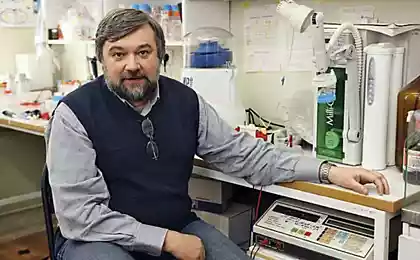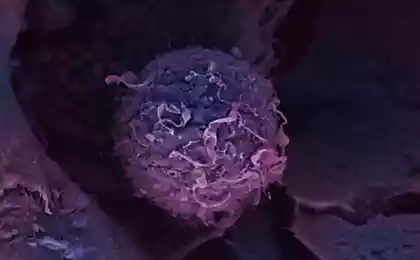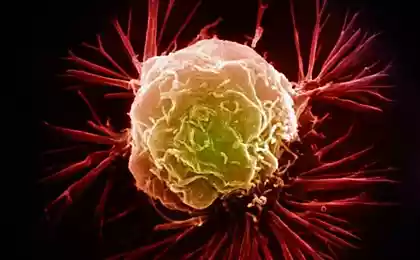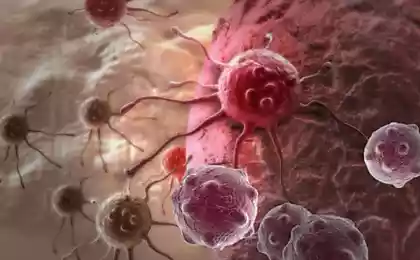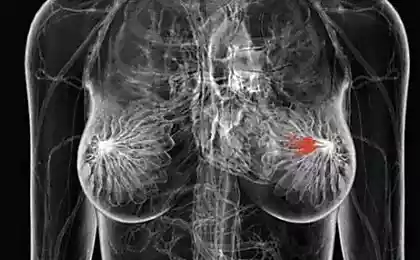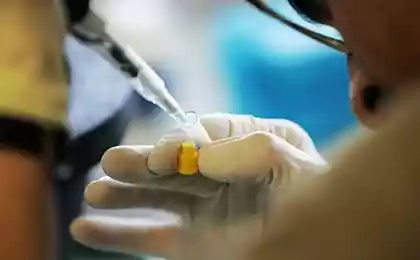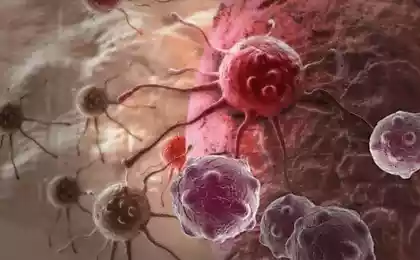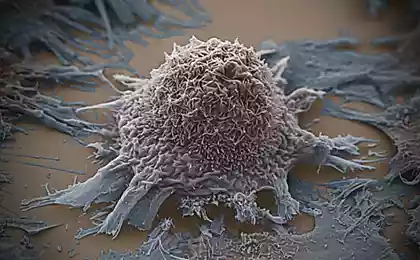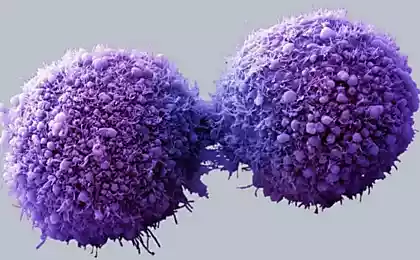600
Green tea against oral cancer
Seventy two million seven hundred six thousand one hundred ninety two
A recent study showed that contained in green tea compound kills cancer cells of the mouth, without damaging healthy cells. Although the ability of green tea to fight cancer was detected earlier, according to scientists, they are now found, due to what is happening.
Researchers from the American University, Penn state studied a special mechanism, which is contained in green tea compound is able to affect the infected cell. Previously, it was found that epigallocatechin-3-gallate (EGCG) is able to kill cancer cells, without damaging healthy cells. However, scientists do not understand the reason behind the drink's ability to destroy cancer cells.The breakthrough is that researchers have identified in the course of the process, the substance attacks cancer cells. Scientists hope that this will contribute to the emergence of new methods of treatment of oral cancer, as well as other types of this disease.
Now researchers believe that epigallocatechin-3-gallate may run into the mitochondria – the energy centre of cells – the process that leads to cell death. According to Professor Joshua Lambert, a specialist of the science of food and the co-Director of the University of Penn state, "EGCG is doing something that damages the mitochondria. This damage to the mitochondria creates a cycle, causing even more damage, and gradually increasing as long as the cell is not subjected to programmed death. It looks like EGCG causes formation of reactive oxygen species, which damage mitochondria, and the mitochondria respond by the production of more reactive oxygen species".
Reactive oxygen species are reactive molecules containing oxygen. They play an important role in cellular signals and homeostasis control of the internal condition, including temperature.
When the level of reactive oxygen species increases dramatically, it can significantly damage the structure of the cell – this process is known as oxidative stress. As the death of the mitochondria decreases the expression of the antioxidant genes in cancer cells that in consequence leads to a reduction of their protective forces.
Professor Lambert added: "Thus, this disables the protection mechanism, while EGCG causes oxidative stress."
Lambert's team found that EGCG did not cause the same reaction in normal cells. In fact, it even seems that the compound increased the protective capabilities of healthy cells.
The researchers studied normal human oral cells and cancer cells of the oral cavity to determine why the connection is affected on cancer cells not as healthy tissue. They grew the normal and cancer cells in Petri dishes and then exposed them to the effects of EGCG, the main polyphenol found in green tea. The researchers used the concentration of the compounds, usually contained in the saliva of man after he chewed chewing gum with green tea.
At a certain time, the researchers collected the cells to check them on oxidative stress and signs of antioxidant response.
According to Professor Lambert, "we also made a lot of photos, so we could use fluorescent dyes that measure mitochondrial function and oxidative stress, and to see how the process evolves".
Team Lambert has identified that the main role in the process plays a protein called "sirtuin".
As told to Lambert, "it plays an important role in the functioning of mitochondria and antioxidant reactions in many tissues of the body, so the idea that EGCG might selectively affect the activity of sirtuin on and off in cancer cells on and off in normal – likely to be applicable to various types of cancer."
The study builds on past work on how the link affects oral cancer — a disease that according to the forecasts this year will killed eight thousand people in the US.
"Previously we published an article that examined the effect of polyphenols green tea on cancer cells of the oral cavity under cultivation. Also there are other articles that describe the use of cancer cells of the oral cavity and at least a couple of studies with experimental animal models, which have been studied oral cancer and its prevention," said Professor Lambert.
If those tests and human trials were successful, scientists hope to create cancer drugs that are as effective as the current, but will not cause harmful side effects.
Professor Lambert says: "the Problem of a large number of chemotherapy drugs — especially early — that they in fact act only on rapidly dividing cells; cancer divides rapidly, but in the same way divide the cells of your hair follicles and intestines, so you get a lot of side effects. But these side effects are not observed when drinking green tea."
What is oral cancer?
Oral cancer is more common among people older than 45 years and mostly affects women.
In oral cancer includes cancers such as cancer of the lips, tongue, gums, mucous membranes of cheeks and lips, sublingual region of the mouth, the upper gums and the area behind the wisdom teeth.
The main reasons for development of oral cancer are Smoking and excessive alcohol consumption, the combination of which increases the risk of developing the disease. Poor diet, improper dental hygiene and irregular visits to the dentist can also increase risk.
The two most common symptoms: non-healing ulcer in the mouth and discomfort or pain in the mouth that will not go away. Other symptoms include white or red patches in the mouth, a bump or thickening on the lips, difficulty or pain when chewing, swallowing or speaking bleeding or numbness in the mouth, a bump on the neck, weight loss and bad breath. published
P. S. And remember, only by changing their consumption — together we change the world! ©
Source: mixednews.ru/archives/72573
A recent study showed that contained in green tea compound kills cancer cells of the mouth, without damaging healthy cells. Although the ability of green tea to fight cancer was detected earlier, according to scientists, they are now found, due to what is happening.
Researchers from the American University, Penn state studied a special mechanism, which is contained in green tea compound is able to affect the infected cell. Previously, it was found that epigallocatechin-3-gallate (EGCG) is able to kill cancer cells, without damaging healthy cells. However, scientists do not understand the reason behind the drink's ability to destroy cancer cells.The breakthrough is that researchers have identified in the course of the process, the substance attacks cancer cells. Scientists hope that this will contribute to the emergence of new methods of treatment of oral cancer, as well as other types of this disease.
Now researchers believe that epigallocatechin-3-gallate may run into the mitochondria – the energy centre of cells – the process that leads to cell death. According to Professor Joshua Lambert, a specialist of the science of food and the co-Director of the University of Penn state, "EGCG is doing something that damages the mitochondria. This damage to the mitochondria creates a cycle, causing even more damage, and gradually increasing as long as the cell is not subjected to programmed death. It looks like EGCG causes formation of reactive oxygen species, which damage mitochondria, and the mitochondria respond by the production of more reactive oxygen species".
Reactive oxygen species are reactive molecules containing oxygen. They play an important role in cellular signals and homeostasis control of the internal condition, including temperature.
When the level of reactive oxygen species increases dramatically, it can significantly damage the structure of the cell – this process is known as oxidative stress. As the death of the mitochondria decreases the expression of the antioxidant genes in cancer cells that in consequence leads to a reduction of their protective forces.
Professor Lambert added: "Thus, this disables the protection mechanism, while EGCG causes oxidative stress."
Lambert's team found that EGCG did not cause the same reaction in normal cells. In fact, it even seems that the compound increased the protective capabilities of healthy cells.
The researchers studied normal human oral cells and cancer cells of the oral cavity to determine why the connection is affected on cancer cells not as healthy tissue. They grew the normal and cancer cells in Petri dishes and then exposed them to the effects of EGCG, the main polyphenol found in green tea. The researchers used the concentration of the compounds, usually contained in the saliva of man after he chewed chewing gum with green tea.
At a certain time, the researchers collected the cells to check them on oxidative stress and signs of antioxidant response.
According to Professor Lambert, "we also made a lot of photos, so we could use fluorescent dyes that measure mitochondrial function and oxidative stress, and to see how the process evolves".
Team Lambert has identified that the main role in the process plays a protein called "sirtuin".
As told to Lambert, "it plays an important role in the functioning of mitochondria and antioxidant reactions in many tissues of the body, so the idea that EGCG might selectively affect the activity of sirtuin on and off in cancer cells on and off in normal – likely to be applicable to various types of cancer."
The study builds on past work on how the link affects oral cancer — a disease that according to the forecasts this year will killed eight thousand people in the US.
"Previously we published an article that examined the effect of polyphenols green tea on cancer cells of the oral cavity under cultivation. Also there are other articles that describe the use of cancer cells of the oral cavity and at least a couple of studies with experimental animal models, which have been studied oral cancer and its prevention," said Professor Lambert.
If those tests and human trials were successful, scientists hope to create cancer drugs that are as effective as the current, but will not cause harmful side effects.
Professor Lambert says: "the Problem of a large number of chemotherapy drugs — especially early — that they in fact act only on rapidly dividing cells; cancer divides rapidly, but in the same way divide the cells of your hair follicles and intestines, so you get a lot of side effects. But these side effects are not observed when drinking green tea."
What is oral cancer?
Oral cancer is more common among people older than 45 years and mostly affects women.
In oral cancer includes cancers such as cancer of the lips, tongue, gums, mucous membranes of cheeks and lips, sublingual region of the mouth, the upper gums and the area behind the wisdom teeth.
The main reasons for development of oral cancer are Smoking and excessive alcohol consumption, the combination of which increases the risk of developing the disease. Poor diet, improper dental hygiene and irregular visits to the dentist can also increase risk.
The two most common symptoms: non-healing ulcer in the mouth and discomfort or pain in the mouth that will not go away. Other symptoms include white or red patches in the mouth, a bump or thickening on the lips, difficulty or pain when chewing, swallowing or speaking bleeding or numbness in the mouth, a bump on the neck, weight loss and bad breath. published
P. S. And remember, only by changing their consumption — together we change the world! ©
Source: mixednews.ru/archives/72573
As a computer program almost unleashed a thermonuclear war
Virus world disorder: what is cyberfeminism


